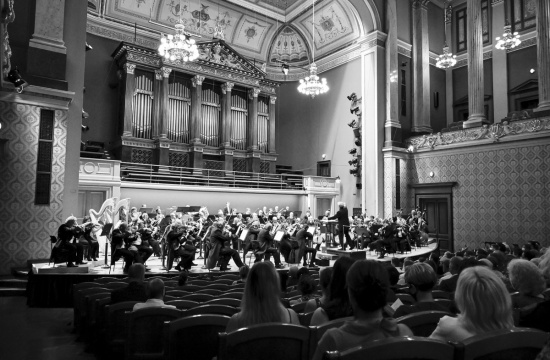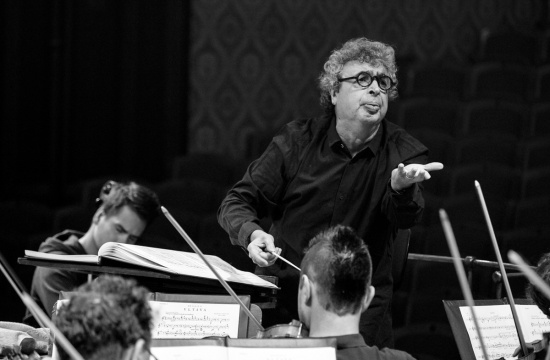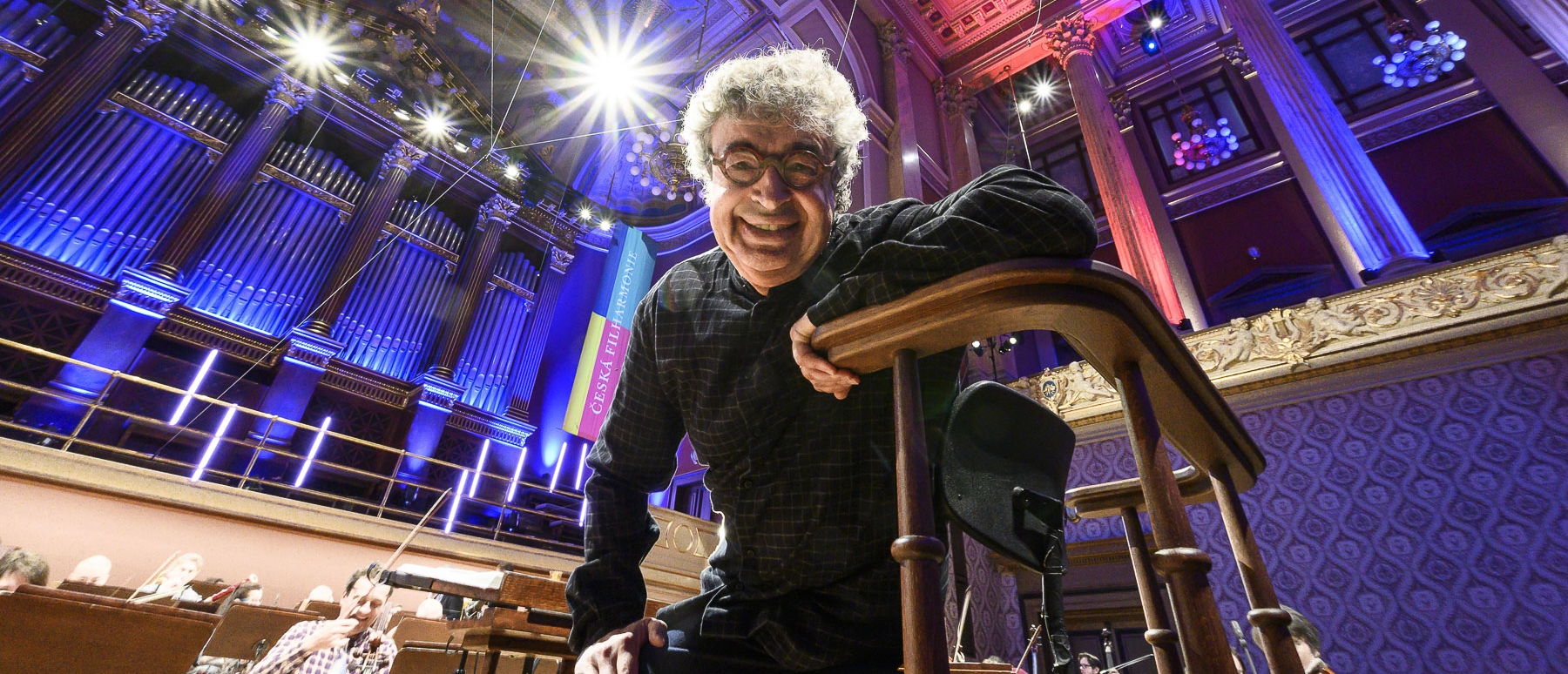Maestro, I would like to ask you at first whether you have learned something new about yourself in this strange time.
Well, that’s a very interesting question because with all the stopping of concert activity since last March, suddenly, I find myself with a lot more time to work, to study, to think, to plan, and in a way it is very beneficial, because when we perform, we give. When we are not performing, we accumulate what we will give later. So, the more you accumulate, the more you can give. And I had the chance to realize once again that in times of crisis, and this is not only a crisis of people’s health, but also an existential crisis, the need for the arts and for spirituality is always greater than during times of great prosperity.
One of your main missions with the Czech Philharmonic at the beginning of your tenure was to bring new music to the repertoire. Does the amount of contemporary music that the orchestra performs affect how they play? Does it affect the sound or the quality of the orchestra, or the flexibility?
Yes, it certainly does. I can even give you one example. We performed the Sinfonia by Luciano Berio at the very beginning of my first season. Luciano’s musical language was so completely unfamiliar that it took some time for the musicians to become comfortable with it and to express it in the same way that they would express Dvořák. By the time we performed it they played it as spontaneously as they would repertoire that they have lived with and know really well. So, in that sense, playing contemporary music is an enormous help with developing the style of an orchestra that needs to be comfortable with music of our time.
In a different way, can it affect how the orchestra plays Dvořák or Mahler – its basic repertoire?
Actually, that is also very interesting – I’ve noticed it with myself – that once we are involved with contemporary music, when we go back to the music with which we have been living all our lives, suddenly we recognise that great contemporary music is very much connected – its roots are in the music of an earlier time, so at some point you go in a reverse direction, and what you experience with contemporary music actually makes you freer with earlier music. And the other way around – when you go from earlier music to later music, you also realise that you apply the same principles – the questions are always: What is the character? What is the phrasing? Is this to be phrased in this way, or the opposite? Working with living composers, you discover that you can always ask them questions. And once you realise that your instincts are correct, then, in a way, it makes you freer with the music of the composers who are no longer living. So it works both forwards and backwards.






Well, I don’t know. Maybe you can describe it to me?
Well, I did try, but it was really hard. I was hoping that you would…
You see! So if it was hard even for you, imagine how hard it is for me. [laughter]
But you are the creator of the sound.
Yes, maybe… But still, it is a very difficult issue, because first of all, there are so many different ways in which we would like to hear or are used to hearing music of the past, based on the experiences we’ve had with it and our experiences of other artists playing it. Of course we can use words to describe it – very singing, a deep string sound, a very distinctive woodwind sound, a very round way of playing the brass instruments, we can say all of that. We can say that it is a sound that has enormous warmth to it, that it has deep musicality, which comes from the musicians themselves. But the only thing that matters is that when people hear the Czech Philharmonic, they know that it is the Czech Philharmonic, and not the Chicago Symphony. It has its own distinctive sound. Its own distinctive kind of musicality.
And that is what I treasure, and not only I, but all of my colleagues. We all share the same desire to preserve the uniqueness of the sound of the Czech Philharmonic. That, of course, does not mean that it becomes like a dusty old painting that is always the same. It cannot, must not be like that. Younger musicians grow up in a different world from their predecessors, and consequently their ideas of sound and phrasing will evolve. And you know that today, every musician is growing up absolutely aware of what their colleagues are doing with the same music everywhere in the world, because everything is accessible.
When Furtwängler conducted The Damnation of Faust by Berlioz, I think they recorded it in the 1930’s or ’40s, I was shocked when listening to it by how un-French, un-Berliozian it sounded. And I said to myself, well, it’s absolutely understandable because he spent so little time in France. He probably could not really speak French, and he really did not know the French mentality because the world then was very much separated, whereas today you can instantly know how the French address their music and how the Germans do.
So expectations today are very different from what they were at that time – also on the part of audiences. And with that comes the most critical challenge for interpreters. It is what I call the authenticity of the spirit of music. It is so natural for Czech musicians who are born with the music of Dvořák in their blood, like the Russians with their Tchaikovsky, etc., but we want to interpret music that is not just from our own culture; we need the music of others. And here comes the great challenge of how to interpret it so that the spirit of the interpretation will feel native to those who are natives of that culture. And that is a tremendous, tremendous challenge because it is a cultural question, not a technical one. Technically, everyone is so strong today that most orchestras can play any kind of music. The question is “How will it sound?”, and “Will it sound authentic in spirit to those who are from the culture of the music being played?”. So you see how complex it is?
Yes, immensely. And what about Mahler, which is going to be recorded? Where does he stand in this question of the authenticity of the spirit of music?
Mahler is a very interesting case, because for the rest of the world, Mahler happens to be an Austrian composer, whereas for me and my colleagues in the Czech Philharmonic, this is Czech music. I mean, it would not occur to anybody listening to Dvořák’s New World Symphony to say that he was an American composer. No, he composed it because of his years in America. So, Mahler was born in the Czech lands, and Mahler’s roots are in the Czech culture.
Is it a task for the Czech Philharmonic to persuade all the world that Mahler is a Czech composer of Czech music?
That is what I have said to my colleagues from day one! I said I would love for the world to believe that Mahler is a Czech composer. Before I started in my position with the Czech Philharmonic, I knew Václav Neumann’s recordings and I knew that music was not unfamiliar to the orchestra. And yet, I was asking myself how Mahler will fit the orchestra when we do it together, because Mahler’s Second Symphony was the very first thing that I conducted as the music director. We played it in September, and we had started rehearsing it in April. Literally from the first minutes of rehearsing that Second Symphony, I said to myself that there was no reason to worry. This music is a part of this orchestra, just as Dvořák, Janáček and Martinů are.
Let’s move on to the new pieces for the Czech Philharmonic. There are fourteen – nine by Czech composers and five by composers from around the world …
I had to give them a chance – it’s not their fault that they weren’t born in the Czech Republic! [laughter]
I’m very glad that you gave them a chance! But I can’t fail to notice that there are no female composers among them.
I know that this is a very hot topic today – women composers, women conductors. Believe you me, I love women no less than men, and maybe even a little bit more. [laughter]. But the only thing that really interests me is talent. Whether these people happen to be white or black or Buddhists or Jews, it plays no role for me at all. It is true that we do not have women composers represented here, but that’s just the way it is. Maybe one day we will. I just don’t want to do something merely because it happens to be politically correct.
The three of them that we hope to be hearing in the spring – Bryce Dessner, Thomas Larcher, and Detlev Glanert – are from, I would say, three completely different worlds of contemporary music, aren’t they?
Yes, they are very different, and thank God, because that is what makes the world richer. Not uniformity, but differences. What we need in our programming is to offer ourselves and our audience a broad palette of aesthetics, expression, and kinds of music that exist. They all have their own individual face, so that you know this is Bryce Dessner, and this is Thomas Larcher. Next year it will be Hořínka and Julian Anderson, etc. They all write what I call real music, not mere sounds, but something that is existential. And one thing that unites all of them, even though they are completely different, is their connection to the past. Their music is an organic outgrowth of the music that was written before them.
You speak of “real music”. Can you recognise such “real music” on first hearing?
Yes, you can. Bryce Dessner finished the piece that he composed for us, called Mari, which is inspired by the goddess of the forest in the Basque country. I listened to it and I found it to be immediately very attractive. If I did, so will the audience. Detlev Glanert sent me the Prague Symphony, which we will premiere in March. It is a very important piece, between 40 and 45 minutes of music, with texts by Kafka. I’ve been conducting his music for the last 20 years and I recognise that language, I recognise Detlev Glanert. It’s based on feeling and previous experience with these particular composers. Now, ask yourself – what is your reaction as a listener when you hear a piece of music for the first time? What is it?
It’s emotion.
Right! That’s exactly what it is, and this is true for everyone. We respond emotionally to anything we encounter for the first time. Either we are touched, or we fall in love, or we hate it, or whatever. But it’s all about emotion, correct?
Or we might be bored – is that still emotion with contemporary music?
It is absolutely an emotion. [laughter]
So I don’t have to feel guilty when I’m bored by contemporary music?
You shouldn’t feel guilty. Listen, there’s nothing worse than when you’re stuck listening to a piece, and it’s kind of something that is crawling under the carpet. You leave the room, you go get yourself a cup of coffee, and when you come back, the piece continues, and it still sounds exactly the same as when you went out. But when you hear something that touches you, first of all, it will wake you up, even if you’re sleeping. Then you would like to hear it again and having already heard it, you begin to recognise it as something familiar. Your intellect starts to work, and you say “aha, interesting” – this is the structure of the piece; this is the language: it is tonal, or it is not tonal; it is 12-tone music so you recognise the row. But that will never be the first reaction. That will come later as a consequence of your interest, and your interest is based on your emotional impression. And I think this is the same for all of us.
Could we talk a bit about the three composers? I would like to ask you about Thomas Larcher’s Cenotaph. You premiered it in 2016. Could you tell me the story of this piece? Because, if I am correct, it is dedicated to the refugees who died in the Mediterranean Sea.
Yes, this is true. Thomas is very conscious of the human condition. This is one of the very important traits for me in composers. Are they really connected to the world, to life itself? Or are they only concerned with what I call the “play of sounds”? The sounds can be very brilliant if someone has enormous intellect, and there is nothing wrong with that. But what is important to me is how a composer expresses the human condition. This piece by Thomas was received with enormous acclaim in Vienna, and I said, OK, that’s wonderful, but he’s an Austrian composer and people there will support him. How will it go elsewhere? Then I conducted it with the BBC Symphony Orchestra at the BBC Proms in London, and with the New York Philharmonic in New York and the response was equally enthusiastic.



Our musicians are so talented that they can play absolutely any music if given time. And if they see that it is what I call “real music”, they will invest themselves. We’ve already played a piece by Detlev Glanert a year ago and they played it splendidly. Detlev said immediately after the concert, “This is my orchestra”. So don’t underestimate the Czech Philharmonic in contemporary music.
Could you tell me something more about the Prague Symphony by Detlev Glanert? Its subtitle is “Lyrical Fragments” and I was wondering… Glanert’s music is anything but lyrical for me, so that made me smile a bit.
Detlev is actually an opera composer. He is a man who thinks in terms of characters, literature, poetry, text, voices – human voices. His last opera Oceane was premiered last year in Berlin at the Deutsche Oper and it was an absolute triumph – both with the public and the media, which is extremely rare. Detlev is very lyrical. He sees a lot of darkness, but he also writes music of enormous tenderness. It’s such a pity that because of the pandemic we were not able to perform his Requiem for Hieronymus Bosch planned for last March. I flew to hear the premiere of it in Amsterdam several years ago and I was absolutely, deeply touched by the beauty of that music.
I’ve read that he often has mentioned Mahler as an influence. Could you tell us what is “Mahlerian” about him?
Lots of things. The sense of something that is grotesque and the sense of beauty as well. Yes, his music resembles the spirit of the music of Mahler, but not only that. Shostakovich is also very much present. There are a few moments in the Prague Symphony – as I was looking at the score, I said to him: “Detlev, this is Strauss’s Elektra!” He is rooted in the great music of the past. And yet, it is music of our time, and it’s his own.
You speak about beauty quite often.
Why shouldn’t I? Isn’t it important? [laughter]
It is! It is…
You know, sometimes I have the feeling that in our times, and this is probably the post-World War II world, we have become very reticent and shy, almost embarrassed, to speak about beauty. And I don’t understand why we should feel that way. How can one live without beauty?
I agree with you. I just wanted to ask if the notion of beauty can change during one musician’s lifetime.
I don’t know whether it really changes, because beauty has, if I might say so, an almost objective definition. And my emotional reactions are quite stable in the matter of recognizing beauty within music.


